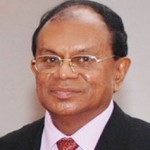New Book By Dr. Laksiri Fernando: Thomas More’s Socialist Utopia and Ceylon (Sri Lanka)
March 6, 2014
Thomas More (1478-1535) was not the first socialist thinker who aspired for a classless society without poverty. But he was the first one to do so by presenting a strong critique of the emerging capitalist society in England in the late 15th and the early 16th centuries. In that sense he was the first ‘modern socialist thinker’ with considerable repute and influence.
This book on Thomas More and his ‘socialist dream’ for the first time argues that when More wrote his Utopia in 1516, he took information from Ceylon, the newly discovered country by the Portuguese, to sketch his dream island. The connection is argued not only on the basis of physical similarities between the two islands but also the social ethos and practices. This book is also a comprehensive exposition of Thomas More’s discourse on socialism, detailing its general philosophy, the political economy, society, political system and the position of religion and the military under socialism. The book also contains an easy to read version of Utopia in Part II. This is primarily a book on theoretical socialism, probably for the first time by a Sri Lankan author.
The author, Laksiri Fernando, further says,
“My purpose is to popularize the socialist dreams that More dreamt about a future society particularly to the Sri Lankan readers. The best way to do so is to bring the ideas of More closer to their social and country surroundings. There is much talk about ‘home grown’ things and solutions in Sri Lanka today. I normally don’t agree with this view. However in respect of socialism, why not people believe that socialist views that evolved in Europe had some indigenous roots in Sri Lanka? To believe that the island’s capital, Amaurot, that More talked about was Kotte and the founder of the island’s civilization, Utopus, was Vijaya, could be of some inspiration to some readers. By the way, Vijaya story is common to both Sinhala and Tamil legend.”
The book is available both in electronic form and as paperback. Two links for ordering are Amazon and CreateSpace with further descriptions of the book. To read the Introduction click here.



